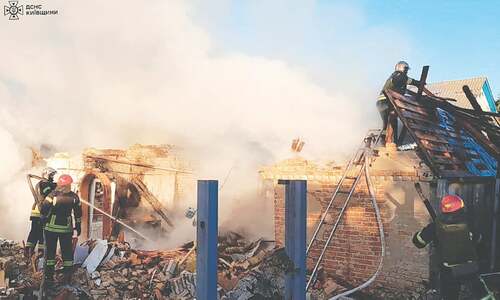BEIRUT: A senior official from the Iran-backed Lebanese group Hezbollah has made a landmark trip to the United Arab Emirates to facilitate the release of more than a dozen Lebanese nationals detained there, four sources close to Hezbollah said.
The visit at the invitation of the UAE could signal a significant shift away from the hostility that has long defined relations between Hezbollah and UAE, a strategic ally of the United States, analysts said.
There was no immediate response from the UAE foreign ministry.
One of the sources described Wafiq Safa’s visit as a “new page” in ties between the UAE and Hezbollah, which is designated a terrorist group by the United States and its Gulf Arab allies.
Safa travelled to the UAE on Tuesday, the sources said. He runs Hezbollah’s Liaison and Coordination Unit, responsible for coordinating with Lebanese security agencies, and is sanctioned by the United States.
The four sources familiar with Hezbollah’s thinking said that the UAE had made contact Hezbollah with a message that they were seeking to release the Lebanese detainees, several of whom were serving life sentences.
The sources said the detainees had been arrested on charges including providing support and finance for Hezbollah, describing these as politically-motivated charges.
All four sources said the detainees would be released in the coming days and would accompany Safa back to Lebanon.
Two of the sources said the UAE asked Hezbollah’s ally Syrian President Bashar al-Assad to pass on the message before the start of the Gaza war, during which Hezbollah and Israel have exchanged fire across the Lebanese-Israeli border.
There was no immediate response from Syria’s information ministry to a request for comment.
One of the sources said the visit suggested an effort to alleviate “some of the regional tensions”, without elaborating.
UAE foreign policy moves in recent years have included restoring ties with Assad, having once backed the rebels seeking to topple him, and normalising ties with Israel in 2020.
The UAE began re-engaging Tehran in 2019, and Saudi Arabia re-established ties with Iran last year.
The tensions between Hezbollah and the UAE reflected a wider struggle between Iran and Sunni Arab Gulf states which fuelled conflicts including wars in Syria and Yemen.
The six-member Gulf Cooperation Council, which includes Saudi Arabia, declared Hezbollah a terrorist group in 2016. The GCC imposed sanctions on Hezbollah in 2013 for entering the Syrian war on Assad’s side.
Published in Dawn, March 21st, 2024
















































Dear visitor, the comments section is undergoing an overhaul and will return soon.